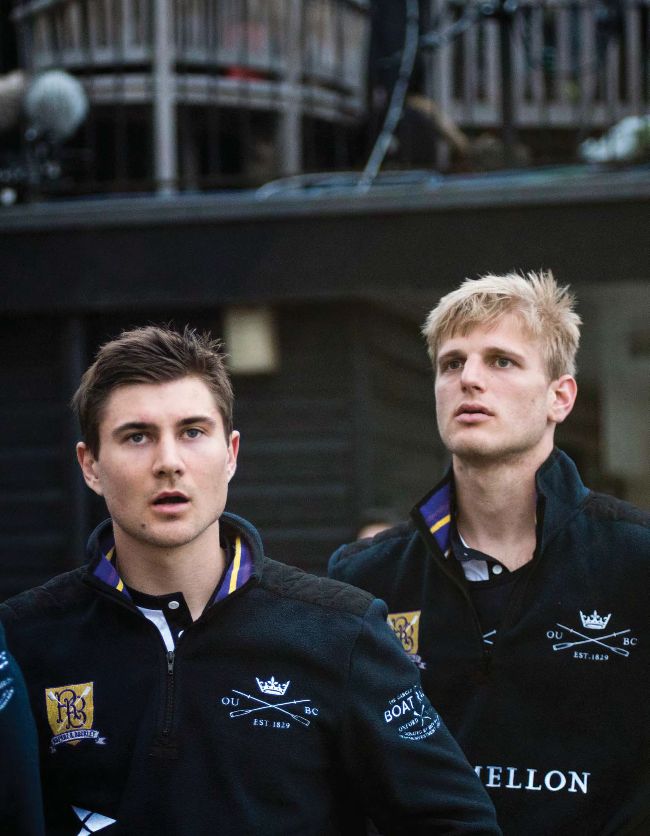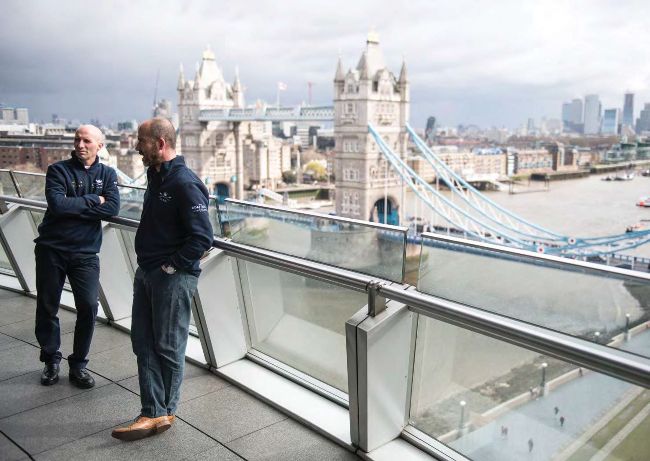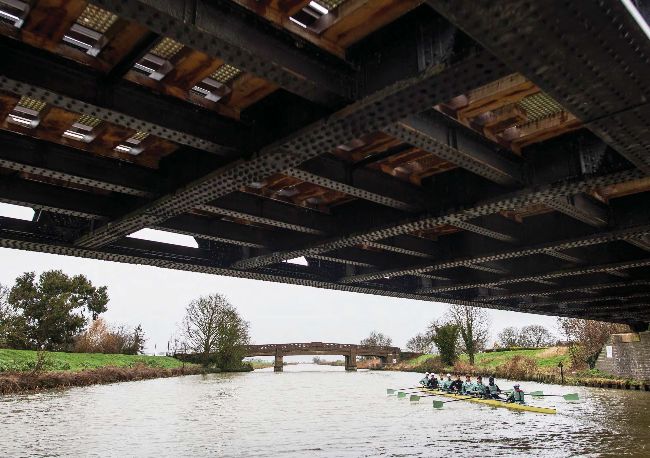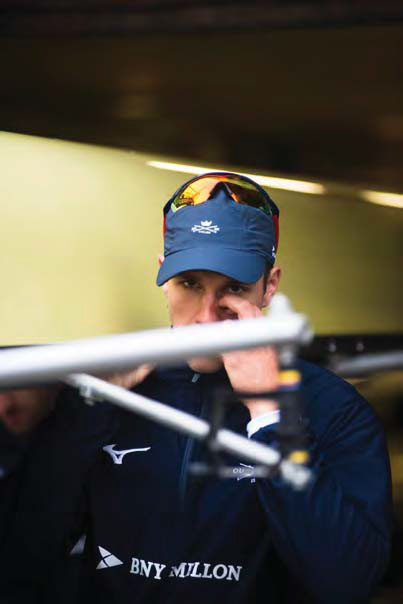Boat Races In Extremis: Let’s Call The Whole Thing Off
WORDS: RACHEL QUARRELL / PHOTOGRAPHY: BENEDICT TUFNELL

OUBC rowers after the 2018 Boat Race.
It’s off. Not “and they’re off”, the words which would have been uttered by BBC commentators at 15:44 and 16:44 on Sunday 29th March as this year’s Oxford v Cambridge Boat Race crews took their first stroke. But the whole thing is off, declared cancelled for the first time ever.
Kaput. Scrubbed. Scratched. It has ceased to be. It is an ex-Boat Race.
So much has happened in a short time that it’s difficult to remember what life was like in Britain as we entered the third week of March 2020. On the morning of Monday 16th March hand-washing had already become as popular as scratching one’s nose had not, and anyone with potential symptoms of Covid-19 was expected to stay behind closed doors for at least a week. But testing was largely fictional except for the worst cases, and there was still a great deal of normal life continuing including many mass events, although some contact sports were starting to postpone fixtures. Things were about to change abruptly.

Oxford coaches Sean Bowden (L) and Andy Nelder (R) at the 2019 Boat Races weigh-in.
At 17:15 GMT on that day Robert Gillespie, Chairman of the Boat Race Company Limited, announced on Twitter and via press release that the Boat Races had been cancelled. Not postponed, but completely removed from the calendar. “This decision is based entirely on our concern for the welfare of our crews, our spectators, our staff and volunteers,” said Gillespie. “The public good far outweighs all other considerations. Cancellation of the Boat Race is therefore clearly the correct decision, but it is not without sad consequence.”
At the time, the decision felt a little extreme, but it was to prove prescient. Within a few hours the UK government announced much more stringent social distancing measures and asked the British public to “avoid gatherings and crowded places, pubs and clubs” and limit “unnecessary travel”. On Tuesday afternoon British Rowing made its own announcement cancelling all its March and April events. By Wednesday 18th the government had shut all schools with a massive impact on all workers with children. Two days later all indoor leisure and sport facilities were closed by government edict, and British Rowing told all affiliated clubs to cease operations on the basis that going to clubs was not essential travel. On Monday 23rd the UK entered its strictest lock-down to date, with no public gatherings of more than two people permitted, and everyone told to exercise by walking, running or cycling alone directly from their house.
Whew, that was fast. Within a few days of the Boat Race cancellation it was blindingly obvious that there would have been no other option.
Back on Monday 16th March, it did seem like a bold and possibly early step to decide not to put on any races at all. The trouble is that Boat Race day is a delicately poised patchwork of thousands of individual stakeholders, so making any change to the plan can disrupt lots of people and organisations. (We’re talking here about the two openweight Blues contests between the rowers of Oxford and Cambridge, plus their two reserve competitions.) Not to mention the academic commitments of the students themselves, which stay their hand for no virus.

The 2020 Cambridge Blue boat training at home in Ely.
Speaking to executive director David Searle on 13th March, at which point no decision had yet been taken, Row360 heard first-hand the difficulties Searle, Gillespie and their board were facing trying to work out what to do. “We’ve talked about a lift and shift - go somewhere else to do it. We’ve talked about delaying it, but the only time we could delay it to, which would make any sense at all, is the third week in June. And that’s not going to work because now that’s going to be right in the peak period for the virus. We’ve talked about doing it in third-party places, other stretches of river, nothing to do with the Boat Race at all, all those things. It’s a matter of saying to ourselves ‘what is the best thing to do’. If we hold the race, then people will come.”
That’s the crux of the problem. A race held on their usual course, from Putney to Mortlake on the Thames Tideway in London, would have attracted thousands of spectators to the towpath, clubs and pubs along the route. In previous years it has been estimated that two to three hundred thousand tend to line the banks along the four and a quarter mile course, varying slightly depending on the weather and whether or not it clashes with other events. “One of our major considerations is the public courtesy we want,” continued Searle. “We’ve got to let people know, there are swarms of stakeholders involved, not only the PLA [Port of London Authority] but the pubs along the river.”
For the race itself, there are the crews, the coaching and admin teams, the parents and relatives of crew-members, some of whom will have won rare tickets in launches and made the trip to London to support. Outside that there are alumni, including ‘reunion’ crews coming to Putney early from across the world to jump in a boat and have a 10-year, 25-year, even 40-year paddle together to mark their historic glory on the morning of the race. The local clubs and hotels who host the crews, and it’s one of the best trade days of the year for the local and waterside restaurants, bars, pubs and shops. Anyone in Putney, Fulham, Hammersmith, Barnes, or Chiswick who holds an event or fund-raiser during the races, and London Youth Rowing who highlight their activities.
“We’ve always had the policy or at least a stated ambition that we go ‘whatever the weather’.”
Those who print and distribute the programme, the security staff, police, marshals and first-aiders who look after the spectators, the five local councils whose areas line the course. The drivers of the boats in the flotillas, the BBC’s outdoor unit with everything from producers and commentators to techs, cameramen and security men to guard cameras set up in fixed points for miles along the bank. The people who raise the flags on the churches either side of the start line. The umpires, the volunteers who help align, weigh and timekeep for the crews, and the press. Over nearly two centuries the races have attracted a thick layer of peripheral involvement from thousands of people. Cancellation is a very big deal.
What about off-the-wall ideas? “We’re the Boat Race - we’ve always had the policy or at least a stated ambition that we go ‘whatever the weather’, said Searle. “Although I do know that if we had lightning I would have to do something about it.” But that’s talking about bad weather affecting a race start for a viable event, not the event itself being unviable.
It’s long been said that even if all sponsorship and advertising income for the race evaporated, the crews would still train and meet to race, just as the women and lightweights have done for decades and as the lightweight clubs did on the Tideway only one day before their open-weight siblings had to cancel. Yes, two 2020 Boat Races have been held, won by the Oxford men’s lightweights and Cambridge women’s lightweights respectively, but only by the lucky accident of timing their contests early enough to avoid the crisis. But a publicised openweights race held at the usual time would inevitably be a crowd magnet, making the Boat Race Company Limited look irresponsible when public gatherings were already being deemed inadvisable.
Why not an area they could have closed to crowds? “We could do it at Dorney, it is private land, but that’s a 2000-metre race, not the same thing at all,” said Searle. “It’s quite hard if you’re rowing, and you’re told you’re going to do a 4.25 mile race...” As the women and lightweights know from recent experience, there is a significant change in training from the shorter Olympic to the longer Boat Race distance. It’s not that Boat Race crews couldn’t race 2km, that would be easy. But would the same crew win? Would the clubs be willing to go down in history as winners or losers on that basis? The early days of the Boat Race, when just managing to arrange a race was a huge success, might have been different. Now, with the weight of that history on their shoulders, the clubs and their athletes want any contest to reflect what they trained for.
There might have been one other option: just get on and race without any warning, to clinch a result before anyone noticed - even if the chances of doing anything in secret on the Tideway are just about zero. For a few short days before the full lockdown it might even have been temptingly feasible, because the Boat Races are not British Rowing events. The idea was briefly mentioned by a Boat Race insider on social media, in an unguarded moment. “We did think about a ‘pirate’ race but were told no,” they said. A wise decision. And by 29th March it would in any case have been illegal.

Back in the early days of the 1800s, the success of the Boat Race started with a challenge being issued by one university and accepted by another: now a formality since it is accepted that both universities will annually train crews. After the first 1829 race Cambridge sent a challenge to Oxford in 1831, but an outbreak of cholera during 1831 may have influenced the decision not to meet the challenge, and no race was even scheduled. The next few cholera epidemics in London coincided with Boat Race years without stopping them, until the race became annual from 1856, after which only the two world wars put it on hold. The Boat Race even escaped the ban on towpath use during the 2001 outbreak of foot-and-mouth disease, because the Tideway’s water was urban-edged, sea-salted and not in a rural or infected region. So this is the first time that a tiny 200-nanometre biological particle has shut down one of the biggest rowing events in the world.
While the rowers and coxes buckled down to nationally-imposed restrictions around the world, OUBC announced that it would treat that year’s crews as if they were holders of Blues and Isis colours, regardless of what the university’s Blues Committee later decides, and both Cambridge clubs announced their planned crews. On the day itself CUWBC rowed 6.8km on ergs and listened to a recording of their cox, a Skype meeting replacing what would have been the biggest moment of their sporting lives.
A shadow of the real thing, but a reminder - as they tweeted - that now the challenge had changed.
From Twitter @CUWBC:
“Taking part @theboatrace is a personal and team journey of physical and mental growth. We have sat in opposition to our @OUWBCsquad but now we stand united against a much bigger rival for all our sakes.
#StayHomeSaveLives
#WereInThisTogether
Previously published in Issue 31 of Row360